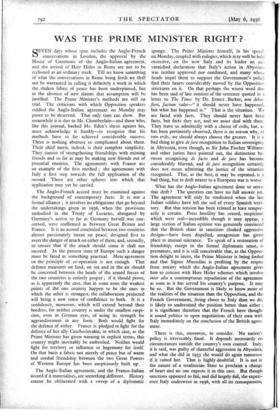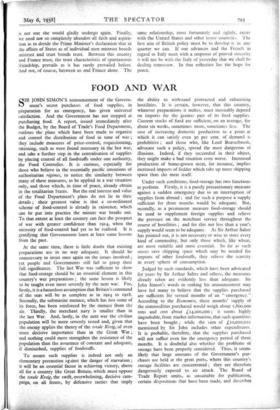WAS THE PRIME MINISTER RIGHT?
SEVEN days whose span includes the Anglo-French conversations in London, the approval by the House of Commons of the Anglo-Italian agreement, and the arrival of Herr Hitler in Rome are not to be reckoned as an ordinary week. Till we know something of what the conversations in Rome bring forth we shall not be warranted in calling it definitely a week in which the shaken fabric of peace has been underpinned, but in the absence of new alarms that assumption will be justified. The Prime Minister's methods are still on trial. The criticisms with which Opposition speakers riddled the Anglo-Italian agreement on Monday may prove to be deserved. That only time can show. But meanwhile it is due to Mr. Chamberlain—and those 'who, like this journal, backed Mr. Eden's thesis against his, must acknowledge it frankly—to recognise that his methods have so far achieved considerable success. There is nothing abstruse or complicated about them. Their chief merit, indeed, is their complete simplicity. They consist of strengthening friendships with existing friends and so far as may be making new friends out of potential enemies. The agreements with France are an example of the first method ; the agreements with Italy a first step towards the full application of the second. There are other spheres into which that application may yet be carried.
The Anglo-French accord must be examined against the background of contemporary facts. It is not a formal alliance ; it involves no obligations that go beyond the undertakings given in 1936, when the provisions embodied in the Treaty of Locarno, abrogated by Germany's action so far as Germany herself was con- cerned, were reaffirmed as between Great Britain and France. It is an accord concluded between two countries almost passionately intent on peace; designed first to avert the danger of attack on either of them, and, secondly, to ensure that if the attack should come it shall not succeed. In the present state of Europe such a danger must be faced as something practical. Mere agreement on the principle of co-operation is not enough. That defence measures on land, on sea and in the air should be concerted between the heads of the armed forces of the two countries is entirely proper ; if it should prove, as is apparently the case, that in some arms the weakest points of the one country happen to be the ones in which the other is strongest, the collaboration projected will bring a new sense of confidence to both. It is a confidence, moreover, which will extend beyond their borders, for neither country is under the smallest suspi- cion, even in German eyes, of using its strength for aggrandisement in any form. Both would fight for the defence of either. France is pledged to fight for the defence of her ally Czechoslovakia, in which case, as the Prime Minister has given warning in explicit terms, this country might inevitably be embroiled. Neither would fight for territory or influence or hegemony for itself. On that basis a fabric not merely of peace but of warm and cordial friendship between the two Great Powers of Western Europe has been auspiciously built up.
The Anglo-Italian agreement, and the Franco-Italian accord if it materialises, are something different. History cannot be obliterated with a sweep of a diplomatic sponge. The Prime Minister himself, in his speed-. on Monday, coupled with eulogies, which may well be held excessive, on the new Italy and its leader an un- varnished declaration that Italy's action in Abyssinia was neither approved nor condoned, and many whof.c heads impel them to support the Government's policy find their hearts considerably moved by the Opposition strictures on it. On that perhaps the wisest word that has been said of late consists of the sentence quoted in a letter to The Times by Dr. Ernest _ Barker, non debuit fieri, factum valet—" it should never have happened, but what has happened is." That is the situation. We are faced with facts. They should never have been facts, but facts they are, and we must deal with them. They leave us admittedly with a choice of evils, but, as has been pertinently observed, there is no reason why, of two evils, we should always choose the greater. It is a bad thing to give de jure recognition to Italian sovereignty in Abyssinia, even though, as Sir John Fischer Williams and other jurists have pointed out, the distinction be- tween recognising de facto and de jure has become considerably blurred, and de jure xecognition certainly does not mean admitting the justice of the situation recognised. That, at the best, it may be repeated, is a bad thing, but to drift nearer to a European war is worse.
What has the Anglo-Italian agreement done to- arrest that drift ? The question can have no full answer yet. The agreement will only be vindicated when the last Italian soldiers have left the soil of every Spanish terri- tory. But that tension has been relaxed at least tempor- arily is certain. Press hostility has ceased, suspicions which were real—incredible though it may appear, a large section of Italian opinion was genuinely convinced that the British share in sanctions cloaked aggressive designs—have been dispelled, antagonism has given place to mutual tolerance. To speak of a restoration of friendship, except in the formal diplomatic sense, is premature, and it is still conceivable that, as the Opposi- tion delight to insist, the Prime Minister is being fooled and that Signor Mussolini is profiting by the respite from anxiety which the Anglo-Italian agreement gives him to concert with Herr Hitler schemes which involve inter alia a contemptuous repudiation of the agreement as soon as it has served his country's purpose. It may be so. But the Government is likely to know more of the realities of the situation than the Opposition, and the French Government, living closer to Italy than we do, is likely to understand the position better than either ; it is significant therefore that the French have thought it sound politics to open negotiations of their own with Italy immediately on the conclusion of the British agree- ment.
There is this, moreover, to consider. No nation'F policy is irrevocably fixed. It depends necessarily on circumstances outside the country's own control. Italy, it is said, was guilty of shameful aggression in Abyssinia, and what she did in 1935 she would do again tomorrow if it suited her. That is highly doubtfuL It is not in the nature of a totalitarian State to proclaim a change of heart and no one expects it in this case. But though sanctions appeared to Pail, and did largely fail, the experi- ence Italy underwent in_1936, with all its consequences, is not one she would gladly undergo again. Finally, we need not sa completely abandon all faith and aspira- tion as to deride the Prime Minister's declaration that in the affairs of States as of individual men mistrust breeds mistrust and trust breeds trust. Between this country and France trust, the trust characteristic of spontaneous friendship, prevails as it has rarely prevailed before. And not, .of course, between us and France alone. The same relationship, most fortunately and rightly, exists with the United States. and other lesser countries. The first aim of British policy must be to develop it in any quarter we can. If our advances and the French in regard to Italy meet. with a. response of proved sincerity it will not be with the Italy of yesterday that we shall be dealing tomorrow. In that reflection lies the hope for peace.



































































 Previous page
Previous page